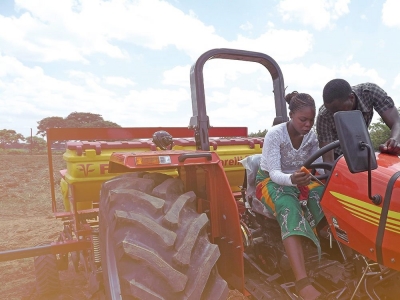A push for sustainable agricultural mechanization in Africa

FAO is supporting the African Union to promote sustainable agricultural mechanization across the continent to boost agricultural production and productivity to feed a growing and rapidly urbanizing population.
Sustainable mechanization – from simple hand tools to motorized equipment – improves productivity along the agrifood value chain and reduces harvest and post-harvest losses. It can ease the burden of hard physical work, reduce labour shortages and improve market access. Technologies should be climate-smart, appropriate, readily available and affordable, targeting women, young farmers and rural entrepreneurs.
At the request of the African Union and FAO member countries, FAO developed the Sustainable Agricultural Mechanization: A Framework for Africa with the Department of Rural Economy and Agriculture of the African Union Commission.
The comprehensive framework provides guidance on tackling challenges and promoting greater uptake of sustainable mechanization. To carry out the framework’s recommendations, FAO’s Investment Centre and Plant Production and Protection divisions jointly organized regional workshops in Côte d’Ivoire (Benin, Senegal, Morocco, Burkina Faso, Côte d’Ivoire) for around 30 people, and in Uganda (Ethiopia, Kenya, Tanzania, Zambia, Ghana, Uganda) for more than 60.
The workshops brought together a wide range of stakeholders, including service providers, to share experiences and explore ways to link good agronomic practices, like conservation agriculture, with sustainable mechanization options.
Public-private dialogue, including with farmers’ organizations, is key for creating an enabling policy environment and building trust. Mobile phone technologies combined with GPS tractor trackers have become new business models. The powerful TROTRO Tractor Limited platform (in Ghana and Zimbabwe and soon in Kenya) is connecting farmers and tractor operators and helping to improve accountability and reduce equipment loss and misuse.
The framework serves as a common long-term vision for African countries on policy and strategy, creating a foundation for regional cooperation, networking and partnerships.
